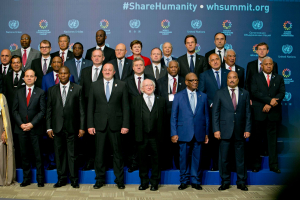High Level Leaders’ Roundtable 4: Humanitarian Financing – Investing in Humanity
Istanbul Congress Centre, Turkey, 23rd May 2016
Excellencies, Ladies and Gentlemen,
At this Summit, we are asked to re-commit to a vision of our shared humanity based on the right of all people to a life of dignity.
We live at a time when our common humanity is tested as rarely before, through our response to conflict, mass migration, poverty, disease and ecological degradation. Humanitarian needs have reached an all-time high.
Although we signed up, as world leaders, to “leave no-one behind” when we gathered at last year’s UN Summit in New York, we are gravely failing those most vulnerable on our planet.
I am not convinced that we drew the necessary lessons from the areas of failure of the Millennium Development Goals.
In this Round Table, we can begin our discussions with the scale of the financing required to adequately respond to these enormous challenges. The numbers are well known: at the beginning of this millennium, $2 billion was raised globally in humanitarian assistance. By 2015, the amount had increased more than twelvefold to $24.5 billion. Yet, there was an assessed demand calculated at $40 billion, leaving a financing gap of $15.5 billion.
How we fill that gap challenges us. For instance if we are to rely to a greater extent on private sources we must ensure that it is done with integrity, ensuring that a humanitarian mask is not provided, for example, for those industries that undermine poorer countries' attempts to establish a national tax base.
If we take the Syrian crisis as example, we see chronic underfunding of food, shelter and health programmes, with devastating consequences for individuals – particularly for women and children – and which fuels the further onward flow in misery for refugees as well as contributing to regional destabilisation.
We are not providing nearly enough assistance, and the assistance we are providing is not having the impact that is needed. The consequence of a mere 14% of what is necessary being provided meant that since August 2014 food vouchers to Syrian refugees were cut from $31 to $19, with 15% of refugees receiving nothing.
We now all agree that it is not a mere rhetorical question as to why we cannot have a bond issue to deal, for example, with the refugee issue.
Our international humanitarian assistance must recognise, reinforce and complement the capabilities which already exist in crisis-hit countries. Our support must be flexible, empowering those most closely representative of the affected communities to make choices, and set parameters. Humanitarian assistance must enable long-term sustainable development and allow for the emergence of new development approaches and models.
The existing models of development have to be restructured and given a chance to breathe to life, by being given space in areas of trade, debt and a globalised system of financial goods. The capacity for new development models must not be put at risk by being raided to heal the humanitarian deficiencies.
For these reasons, Ireland is committed to adapting our development funding to support fragile and crisis affected contexts, reinforcing national leadership and accountability where possible. Starting from this year, Ireland commits to providing at least 30% of its humanitarian funding as non-earmarked. Ireland will also seek to channel more of our support to local and national humanitarian actors, through our support for the UN pooled funds and the vital UN Central Emergency Response Fund.
But crucially, our support must be reliable and consistent, a source of confidence to our partners as they face ever-changing challenges. Our support must constitute a tangible demonstration that the international community keeps its word, and that our pledges are sincere. That we are committed to a long-term partnership for development, and not just to short-term responses.
We are facing a global situation of great complexity and deepening crisis in many regions. The cost of failing to act now cannot be measured in dollars alone, but in its consequences for the future of humanity.
Thank you

